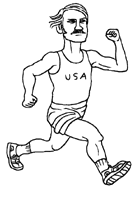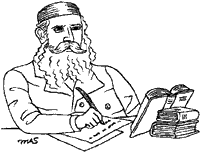
Movies
Without Limits (Warner Bros.). The second biopic about record-breaking superstar runner Steve Prefontaine is deemed worthier than its 1997 predecessor, Prefontaine. "[A] richly intimate sports fable," says Entertainment Weekly's Owen Gleiberman. Billy Crudup (as Prefontaine) and Donald Sutherland (as coach Bill Bowerman) are said to be at the top of their game. So is director and co-writer Robert Towne (Personal Best, Chinatown), who "holds the enigma of Prefontaine's self-propulsion up to the light, turns it this way and that, and then wisely leaves us more or less in the dark" (Daphne Merkin, The New Yorker). (Explore this collection of photos of the real Prefontaine.)
Knock Off (Sony Pictures Entertainment/TriStar Pictures). The only film released on Labor Day weekend, the latest Jean-Claude Van Damme vehicle is trashed for its preposterous plot: The Russian mafia has put miniature bombs in the buttons of jeans in order to blackmail the world. "Pay up, or your pants explode," as the Daily News' Dave Kehr puts it. Directing (by Hark Tsui) and cinematography are said to be imaginative and the Hong Kong scenery interesting, but the performance of "the Belgian blowhard" (Rod Dreher, the New York Post) is dismal. Only the Los Angeles Times' Kevin Thomas disagrees, calling it "one of Van Damme's best movies ever." (Visit the official site .)
Next Stop Wonderland (Miramax Films). Mixed reviews for co-writer-director Brad Anderson's "beguiling, if slight" film (Leah Rozen, People). It follows two interesting but lonely singles (Hope Davis and Alan Gelfant) who keep almost meeting each other around Boston. Some critics admire the witty "amused sense of yuppie tragicomedy" (Lisa Schwarzbaum, Entertainment Weekly), others say the film "isn't really much more than a beautifully acted, finely edited sitcom" (Stephen Holden, the New York Times). Everyone loves the Brazilian bossa nova soundtrack. (Read more about the film on the Sundance Web site.)
Death
Akira Kurosawa (1910-1998). The legendary Japanese director of such films as Rashomon, The Seven Samurai, and Ran is canonized: "one of the handful of truly important directors that the cinema has produced" (Rick Lyman, the New York Times). Steven Spielberg calls him "the pictorial Shakespeare of our time." A perfectionist and demanding taskmaster--he was often referred to as "the emperor"--he was more popular abroad than at home and late in his career had to ask foreign countries and American directors for financial backing. Also noted are hints of nationalism in his last few films, which were not as well received as his early masterpieces. (Here is a complete listing of his filmography.)

Books
The Professor and the Madman: A Tale of Murder, Insanity, and the Making of the Oxford English Dictionary, by Simon Winchester (HarperCollins). A dual biography of James Murray, the primary editor of the Oxford English Dictionary, and his most prolific contributor, W.C. Minor, a convicted murderer who spent most of his life in institutions for the criminally insane. "[T]he linguistic detective story of the decade," says William Safire in the New York Times Magazine. Most reviewers concur. Quibbles: Doubts are raised about explanations offered for Minor's sexual mania, which tormented him so severely that he amputated his penis. Also considered a stretch is the suggestion of romance between Minor and the widow of his victim. (You can buy this book at Amazon.com.)
At Home in the World: A Memoir, by Joyce Maynard (Picador). First reaction to Maynard's memoir, based mainly on a pre-publication excerpt in Vanity Fair: instant dismissal. The crimes against taste of which Maynard is accused include 1) cashing in on her former paramour J.D. Salinger's fame (she held out for years before dishing dirt on him); 2) not respecting Salinger's fanatically guarded privacy; 3) bad writing; and 4) self-importance. The second wave of reviews amount to a backlash against the backlash. Daily New York Times critic Michiko Kakutani says the book "is not a sleazy tell-all memoir" and is a "leap forward in maturity and emotional candor." In the New York Times Book Review, Katha Pollitt calls the book "riveting and disturbing," though she adds, "I often found myself wondering how much of her own story Maynard understands." (Read more about Maynard's life on her photo-filled Web page.)
Recent "Summary Judgment" columns
Movie--Blade;
Movie--Why Do Fools Fall in Love;
Movie--54;
Book--The Farming of Bones, by Edwidge Danticat;
Music--The Miseducation of Lauryn Hill, by Lauryn Hill.
Movie--Dance With Me;
Movie--Your Friends & Neighbors;
Movie--Unmade Beds;
Television--The Rat Pack (HBO);
Book--The First Eagle, by Tony Hillerman;
Book--Summer of Deliverance: A Memoir of Father and Son, by Christopher Dickey;
Book--Kaaterskill Falls, by Allegra Goodman.
Movie--The Avengers;
Movie--Return to Paradise;
Movie--The Slums of Beverly Hills;
Music--Whitechocolatespaceegg, by Liz Phair;
Book--The Father of Spin: Edward L. Bernays and the Birth of Public Relations, by Larry Tye;
Book--Philistines at the Hedgerow: Passion and Property in the Hamptons, by Steven S. Gaines.
Movie--Snake Eyes;
Movie--Halloween: H20;
Movie--How Stella Got Her Groove Back;
Book--Rainbow Six, by Tom Clancy;
Television--Jerry Seinfeld: I'm Telling You for the Last Time--Live on Broadway (HBO);
Television--The Upright Citizens Brigade (Comedy Central).
--Eliza Truitt